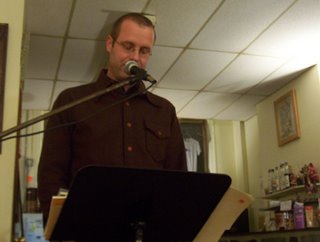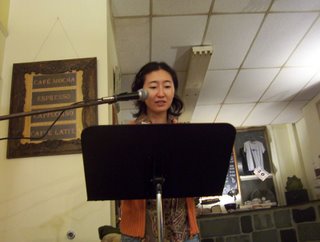‘I Will Die Of Christina’: A Review Of Christina Davis’s Forth A Raven. Alice James Books: 2006. $14.95
She said, I love you.
He said nothing.
As if there were just one
of each word and the one
who used it, used it up.
In the history of language
the first obscenity was silence.
As one hand implies the other, the flipside of this pro-lingua logic is a recognition and near acceptance of language’s ultimate inability to capture a thing in full—its inevitable shortcomings in describing what really happens. Davis speaks to this inadequacy well in ‘The Outset’, where she writes
Before there was a self, there were many hunches,
many came to the cradle
but in going began
to define me as what-does-not-go-away.
Along with themes of defining the world and its parts by negation, & the state of language as inevitably and inescapably fragmentary, Davis stresses healthy detachment as a way of moving through the world, reminding readers, in ‘The Raven’s Book’ (pg. 31), the book’s longest poem at five-parts and five pages:
Consider the ravens, sayeth the lord,
for they neither sow nor reap, they keep nothing in store.
For which god feeds them.
Just above these lines is the following passage, a further bolstering of definition by negation (mountains known as mountains via the valleys’ existence beneath them), in which Davis argues that the life of the mind—memory in all of its varied incarnations—is perhaps a more sure-footed terrain than the life we could well call the social life:
Do you think there is such a thing as a happy memory?
Aren’t the mountains in debt
to the valleys? Sometimes I think only sad memories
could truly be happy. They are final in the mind.
Any poem not only referencing a passage from the Bible, an Emily Dickinson couplet, and the life and harrowing dissolve of the poet Osip Mandelstam, but attempting to interweave meaningfully, has a great and harrowing task before itself.
In many ways, ‘The Raven’s Book’ forms the crux of Forth A Raven, in placing the raven both on the book spine and cover, and roughly at the center of the collection. Forth A Raven divines its name from Genesis 8, in which Noah sends two birds out into the world as runners to report back to him the status of the flood. The dove returns, the raven does not.
It would seem, then, that the fate of the raven is left open-ended, as are many of the poems that comprise Davis’s book. She offers readers answers to the questions she poses, knowing full well they’re only gestures, but, equally, knowing those gestures are all we’ve got to give. In this way, by acknowledging language’s shortcomings in her own poems, Davis renders herself a sort of self-conscious speaker. The effect of this rhetorical move is one part dissatisfaction, as it’s difficult not to wish the poet to overcome her—and language’s—admitted limitations. But it’s also one part deference toward Davis, and this part is the larger of the two, for her candor and subsequent tenderness in admitting these limitations, but still walking up to them and facing them vis á vis.
Forth A Raven is a collection of poems rife with questions and subsequent attempts at answering them. A quick glance at the first ten pages finds a relatively representative cross-section of the book’s pressing interrogatory theme:
Do you love me? Will I die?
‘Are you sleeping? Are you beginning
to go away?”
Why do you say dear god,
as if you were writing to him?
Am I not still and hare-like?
Don’t I give off the least reak of meat?
It is these nods at, and toward, human ephemerality and inquiry that Davis repeatedly bends. Some of her most telling moments arrive when she is offering readers an answer to the questions she’s posed, such as, and especially, in ‘The Calling’:
We go forth in the name we lived.
I will die of Christina.
I was so called.
Language may not provide us with an architectural framework we would choose, as it is faulty & at most a gesture toward solidity. For all her unadorned and leaning toward simpler language, Davis sets a high bar for anyone, poet or not, who might choose to fan a set of answers before a litany of questions posed in a single 49-page book.
--Review by Erin Bertram.





